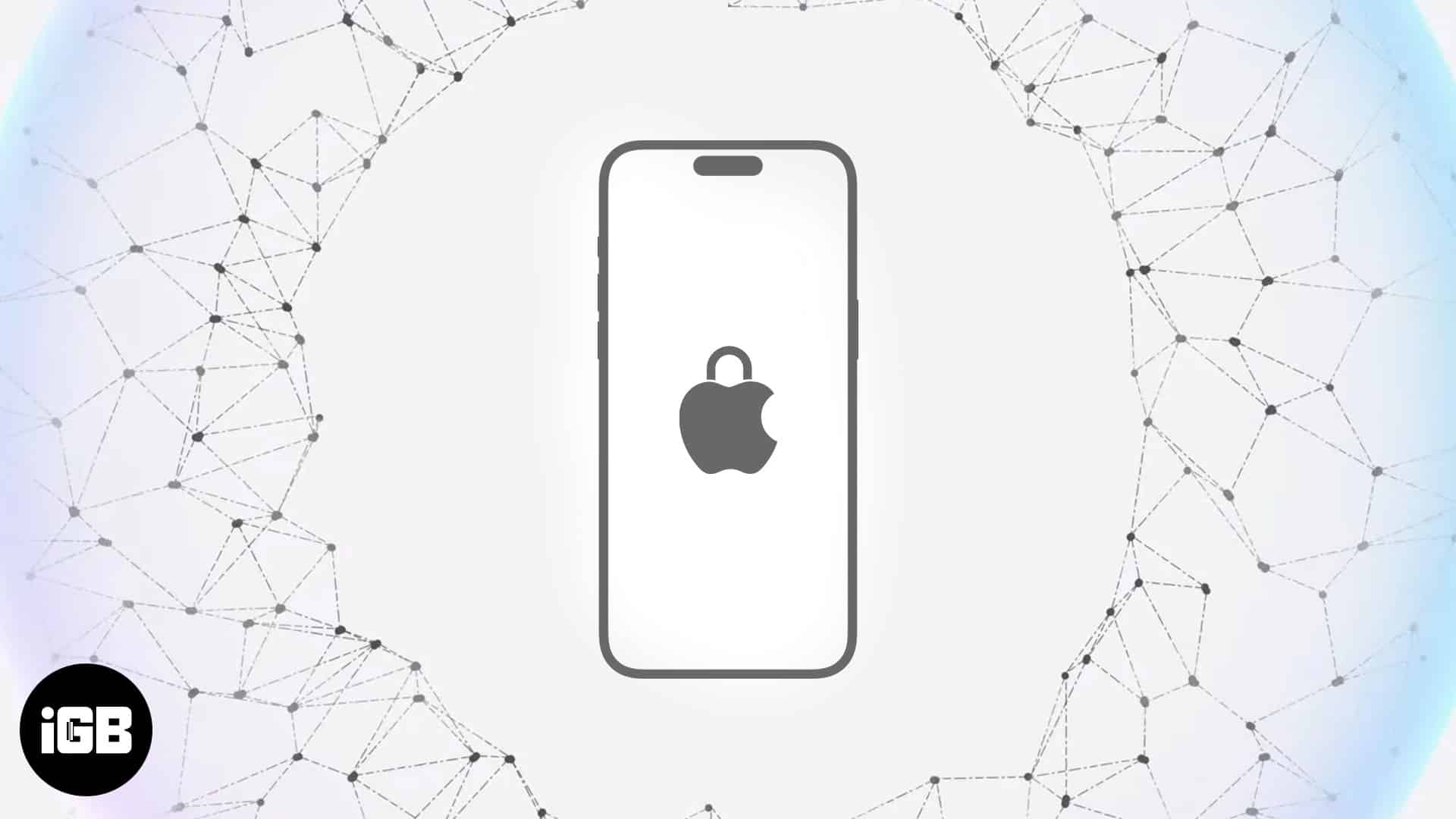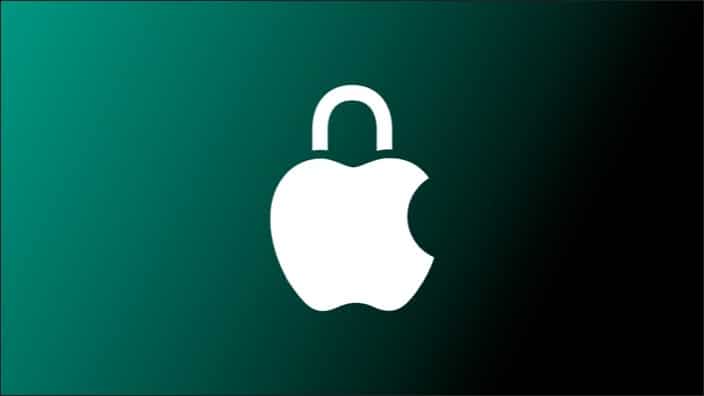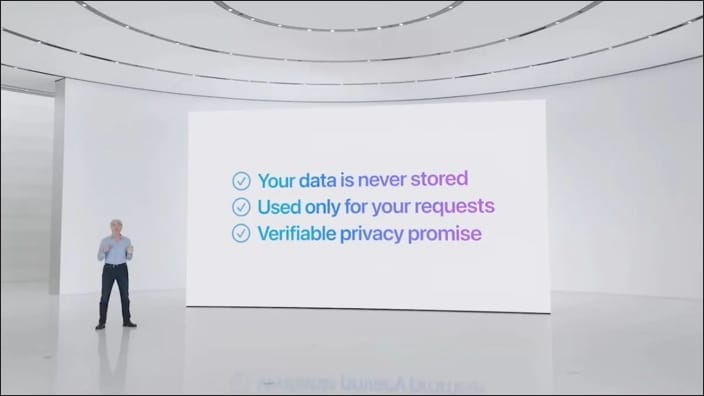It is a proven fact that Apple might get a bit late in offering features that other brands already offer, but when it does, it does so with perfection. This time, the latest Private Cloud Compute (or PCC) is sure to disrupt the landscape of cloud-based artificial intelligence processing. With growing online privacy concerns around the globe, Apple Private Cloud Compute promises to deliver powerful Apple Intelligence processing while maintaining unparalleled user privacy.

Continue reading to learn everything you need about Apple’s Private Cloud Compute.
What is Apple’s Private Cloud Compute?
Apple designed its Private Cloud Compute to handle the processing of complex Apple In intelligence tasks in the Cloud without compromising user privacy.
At the Its Glowtime event, Apple touted PCC “as the most advanced security architecture ever deployed for cloud-based AI computing at scale.” And with Apple also joining the AI bandwagon with its own Apple Intelligence with iOS 18, macOS Sequoia, and iPadOS 18, the Private Cloud Compute becomes the element of how Apple’s AI models process data in a super secure and private manner.
The sole purpose behind creating Apple’s Private Cloud Compute is to meet users’ demand for more powerful AI tools and operations, which often require more power than their devices can handle. The PCC takes the processing to the Cloud, but unlike other cloud bas3d servers, it ensures that the user data is retained or exposed even to Apple itself.
The core of PCC: Private and Security
At the heart of PCC is a highly secure, custom-built server architecture that combines Apple silicon, Secure Enclave, and Secure Boot, running on a hardened operating system. Apple has specifically designed this architecture to handle large language model (LLM) inference workloads, which are essential for tasks like natural language processing, image recognition, and other generative AI tasks.

Here are the reasons why the Cupertino tech giant achieved this level of privacy and security on a cloud-based system:
- Stateless Computation: Apple’s Private Cloud Compute works on the basic principle of stateless computation, meaning neither Apple stores any user data nor is it accessible once the task is done and dusted. After the Apple Intelligence task concludes, any data involved in the process is immediately discarded from the server. Not even Apple has the power to retain any user-related sensitive information.
- Narrow Attack Surface: To minimize the potential vulnerabilities associated with Cloud Computing, Apple used a combined approach of Pointer Authentication Codes, sandboxing, and a principle of least privilege. This approach is tailored specifically to restrict the number of breachable points in the system to restrict hacking chances. And even if an attacker is able to breach the system at any point, the approach ensures the breach stays limited to the particular part, so the extent of the breach would be severely limited.
- Oblivious HTTP (OHTTP) Relays: One of PCC’s most innovative aspects is its use of Oblivious HTTP (OHTTP) relays. These relays, operated by independent third parties, ensure that user requests are anonymized, concealing each request’s origin (IP address). This means that the data is protected, and even the request itself cannot be traced back to the user.
- Transparency and Inspection: In an unusual step, Apple has also invited independent security experts to inspect the code running on its servers to prove the PCC’s mantle. Every piece of software used in the PCC system, from the OS to the applications, is logged and made publicly available for inspection within 90 days of deployment. This move enhances transparency and reassures users that the system is as secure as Apple claims.
Powering Apple Intelligence
Apple’s Private Cloud Computing isn’t just about user privacy; it is also the main powerhouse of most of Apple’s next-gen Apple Intelligence features. Alongside the new operating systems for iPhone, iPad, and Mac, users will be able to enjoy the all-new Apple Intelligence features, built on in-house AI generation models.

While most of Apple Intelligence tasks can be processed on-device, more complex tasks that require additional processing power are handled by PCC. Thanks to PCC’s stateless computing and privacy protection mechanism, Apple guarantees that user data is always secure despite cloud processing.
Availability and device support
According to Apple, both Apple Intelligence and PCC will roll out later this fall, but both won’t be available for all Apple devices. Apple has confirmed that Apple Intelligence is only available to iPhone 16 Series, iPhone 15 Pro and Pro Max, and Apple Silcon-powered iPads and Macs.
Additionally, to use the Apple Intelligence features, at least in the initial phase, both the device and Siri language must be set to U.S. English.
The Future of AI with Apple
With the announcement of PCC with Apple Intelligence, Apple is setting a totally new standard for cloud-based AI computing by ensuring user data is never exposed and stored no matter what, ensuring users’ peace of mind. As more tasks of our daily lives are influenced by artificial intelligence, Apple’s commitment to user privacy is commendable.
Feel free to reach out to us via comments if you have any questions.
Also read:

